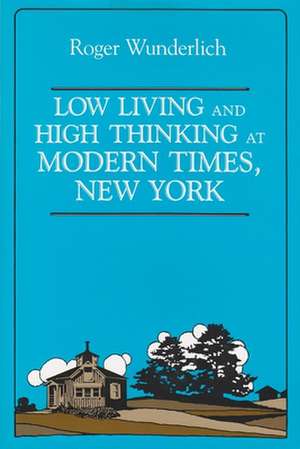Low Living and High Thinking at Modern Times, New York: UTOPIANISM & COMMUNITARIANISM
Autor Roger Wunderlich, Paul Avrich Collection (Library of Congren Limba Engleză Hardback – 31 mai 1992
Preț: 290.12 lei
Nou
Puncte Express: 435
Preț estimativ în valută:
55.52€ • 60.29$ • 46.64£
55.52€ • 60.29$ • 46.64£
Carte indisponibilă temporar
Doresc să fiu notificat când acest titlu va fi disponibil:
Se trimite...
Preluare comenzi: 021 569.72.76
Specificații
ISBN-13: 9780815625544
ISBN-10: 0815625545
Pagini: 259
Dimensiuni: 157 x 240 x 25 mm
Greutate: 0.59 kg
Ediția:New.
Editura: Syracuse University Press
Seria UTOPIANISM & COMMUNITARIANISM
ISBN-10: 0815625545
Pagini: 259
Dimensiuni: 157 x 240 x 25 mm
Greutate: 0.59 kg
Ediția:New.
Editura: Syracuse University Press
Seria UTOPIANISM & COMMUNITARIANISM
Textul de pe ultima copertă
In the mid 1800s, deep in the Long Island pine barrens, Modern Times was established as an experimental community whose members would not be bound by any government, church, constitution, or bylaws. Never more than 150 strong, set on a plat of only 90 acres, here was a haven for nonconformists. Its currency was words; its religion was discussion; its standard of conduct was unfettered individual freedom. Low Living and High Thinking at Modern Times, New York rescues this model village from obscurity and demonstrates its importance in the history of American communitarianism and social reform, especially in its pursuit of economic justice, women's rights, and free love. The first full-length study of Modern Times, Wunderlich's account offers telling portraits of this small but significant group of reformers, pioneers, freethinkers, and sexual radicals. For 13 years they tested the precepts of the founders of the community, the philosophical anarchists Josiah Warren and Stephen Pearl Andrews, who advocated the sovereignty of the individual and private, but profitless enterprise. Each person lived as he or she pleased, provided this did not impair the right of another to do the same; and each traded goods and services at cost, rather than market value, enabling cash-poor pioneers to own homesteads. The community championed every kind of reform, from abolitionism, women's rights, and vegetarianism to hydropathy, pacifism, total abstinence, and the bloomer costume. Indifference to marital status and the advocacy of a free-love vanguard contributed to the community's controversial and somewhat illicit reputation. In 1864, seeking to remove themselves from the limelight, Modern Times'sremaining settlers renamed the village Brentwood. Wunderlich pieces together the village, person-by-person, by relying on primary sources such as land deeds, census entries, and eyewitness accounts. He also sheds new light on Warren and Andrews, two key figures in the communitarian movement, and discusses at length such important contemporaries as Thomas and Mary Gove Nichols, Robert Owen, John Humphrey Noyes, Horace Greeley, John Stuart Mill, Henry David Thoreau, Ralph Waldo Emerson, and George Ripley.







